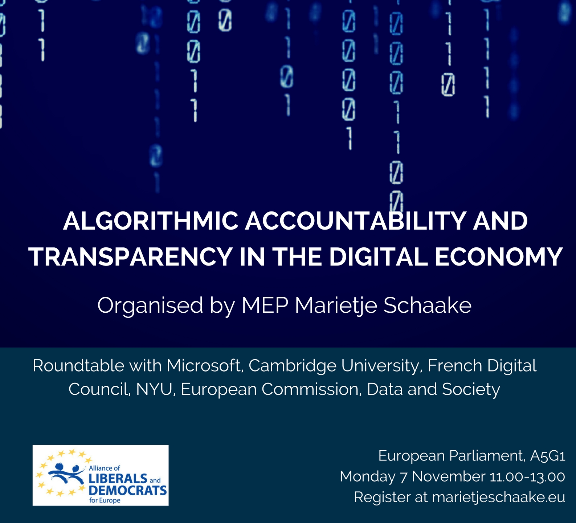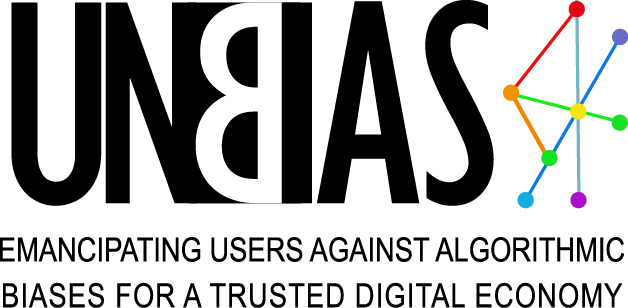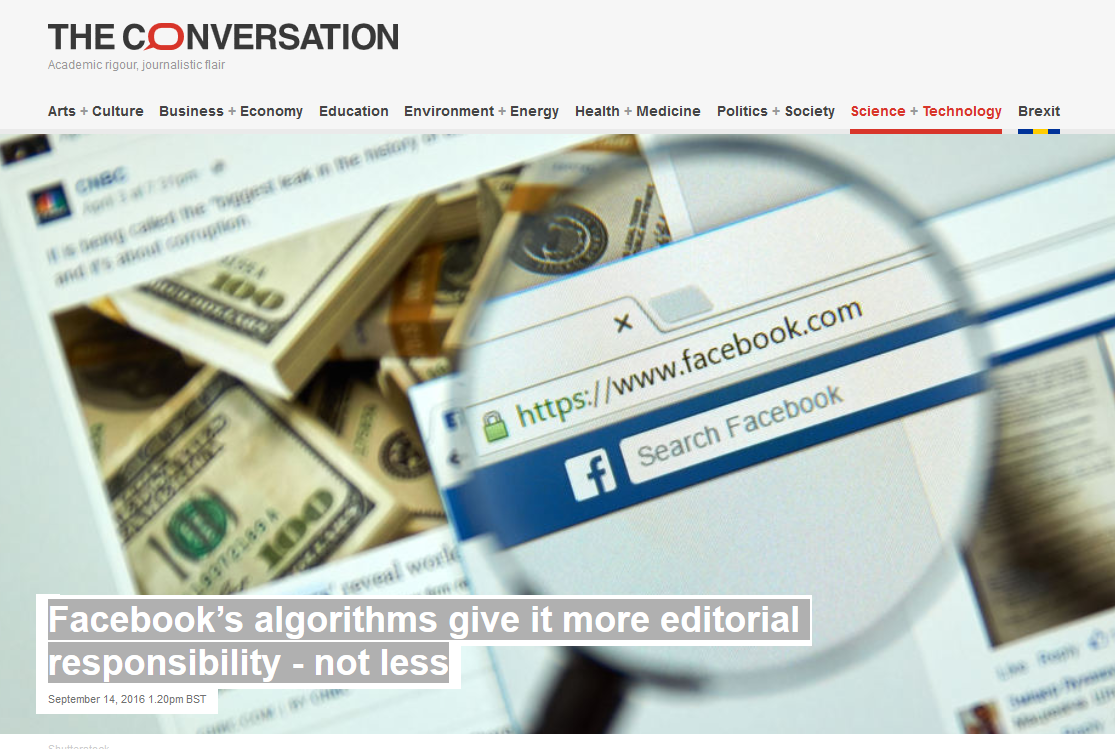 On November 7th I attended the Algorithms Transparency and Accountability in the Digital Economy roundtable event that was organized by MEP Marietje Schaake for the purpose of “discussing which options the European Union has to improve the accountability and/or the transparency of the algorithms that underpin many business models and platforms in the digital single market.”
On November 7th I attended the Algorithms Transparency and Accountability in the Digital Economy roundtable event that was organized by MEP Marietje Schaake for the purpose of “discussing which options the European Union has to improve the accountability and/or the transparency of the algorithms that underpin many business models and platforms in the digital single market.”
Invitation to participate in stakeholder engagement workshops
 We invite stakeholders from academia, education, government/regulatory oversight organizations, civil society, media, industry and entrepreneurs to contribute to our ongoing research study by taking part in a small number of stakeholder engagement workshops. These workshops will explore the implications of algorithm-mediated interactions on online platforms. They provide an opportunity for relevant stakeholders to put forward their perspectives and discuss the ways in which algorithms shape online behaviours, in particular in relation to access and the dissemination of information to users. The workshops will provide an excellent opportunity for participants to exchange ideas and explore solutions with perspectives from a wide range of stakeholders. Following each workshop the participants will receive an anonymized report of the outcomes, which will contribute to the production of policy recommendations as well as the design of a ‘fairness toolkit’ for users, online providers and other stakeholders.
We invite stakeholders from academia, education, government/regulatory oversight organizations, civil society, media, industry and entrepreneurs to contribute to our ongoing research study by taking part in a small number of stakeholder engagement workshops. These workshops will explore the implications of algorithm-mediated interactions on online platforms. They provide an opportunity for relevant stakeholders to put forward their perspectives and discuss the ways in which algorithms shape online behaviours, in particular in relation to access and the dissemination of information to users. The workshops will provide an excellent opportunity for participants to exchange ideas and explore solutions with perspectives from a wide range of stakeholders. Following each workshop the participants will receive an anonymized report of the outcomes, which will contribute to the production of policy recommendations as well as the design of a ‘fairness toolkit’ for users, online providers and other stakeholders.
Further information and details about the workshops is available at the WP4 Invitation for stakeholder engagement page.
Algorithmic discrimination: are you IN or OUT?
 A lot has been said about algorithms working as gatekeepers and making decisions on our behalf, often without us noticing it. I can surely find an example in my daily life where I do notice it and benefit from it. This happens when I use the “Discover Weekly” Spotify play-list. By comparing my listening habits to that of other users with similar but not identical choices, Spotify allows information on the fringes to be shared. It is thus “tailored” to my music taste, and it is incredibly accurate in predicting things I would like. Besides, it lets me discover new music and bands and in many occasions can also take me back in time with some tunes I have probably not listened to for a long time.
A lot has been said about algorithms working as gatekeepers and making decisions on our behalf, often without us noticing it. I can surely find an example in my daily life where I do notice it and benefit from it. This happens when I use the “Discover Weekly” Spotify play-list. By comparing my listening habits to that of other users with similar but not identical choices, Spotify allows information on the fringes to be shared. It is thus “tailored” to my music taste, and it is incredibly accurate in predicting things I would like. Besides, it lets me discover new music and bands and in many occasions can also take me back in time with some tunes I have probably not listened to for a long time.
Continue reading Algorithmic discrimination: are you IN or OUT?
Official press release to announce the start of the project
Courtesy of the University of Nottingham Press-office, the UnBias project sent out a press release to notify about the launch of our project. The press-release was picked up by ScienceDaily, AlphaGalileo and Eurekalert among others. The full text of the press-release is reproduced below.
Continue reading Official press release to announce the start of the project
News, algorithms bias and editorial responsibility
 In an almost suspiciously conspiracy-like fashion the official launch of UnBias at the start of September was immediately accompanied by a series of news articles providing examples of problems with algorithms that are making recommendations or controlling the flow of information. Cases like the unintentional racial bias in a machine learning based beauty contest algorithm, meant to remove bias of human judges; a series of embarrassing news recommendations on the Facebook trending topics feed, as a results of an attempt to avoid (appearance of) bias by getting rid of human editors; and controversy about Facebook’s automated editorial decision to remove the Pulitzer prize-winning “napalm girl” photograph because the image was identifies as containing nudity. My view of these events? “Facebook’s algorithms give it more editorial responsibility – not less“ (published today in the Conversation).
In an almost suspiciously conspiracy-like fashion the official launch of UnBias at the start of September was immediately accompanied by a series of news articles providing examples of problems with algorithms that are making recommendations or controlling the flow of information. Cases like the unintentional racial bias in a machine learning based beauty contest algorithm, meant to remove bias of human judges; a series of embarrassing news recommendations on the Facebook trending topics feed, as a results of an attempt to avoid (appearance of) bias by getting rid of human editors; and controversy about Facebook’s automated editorial decision to remove the Pulitzer prize-winning “napalm girl” photograph because the image was identifies as containing nudity. My view of these events? “Facebook’s algorithms give it more editorial responsibility – not less“ (published today in the Conversation).
Introducing: UnBias

In an age of ubiquitous data collecting, analysis and processing, how can citizens judge the trustworthiness and fairness of systems that heavily rely on algorithms? News feeds, search engine results and product recommendations increasingly use personalization algorithms to help us cut through the mountains of available information and find those bits that are most relevant, but how can we know if the information we get really is the best match for our interests?
Welcome to the UnBias project
Dear visitor
thank you for your interest in the “UnBias: Emancipating Users Against Algorithmic Biases for a Trusted Digital Economy” project. What you find here is a temporary welcome message. The site is still under construction and will be gaining more content in the coming weeks to better introduce our work.
The official start date for this project is September 1st 2016, so please bear with us as we get things ready.
Sincerely,
the UnBias team
